Why Early Starts Became My New Normal
After years of hiking in Japan, several of my “ways” have changed: I now tend to hike solo, rely on public transport instead of driving as I once did back in Australia, and carry a dedicated GPS. But above all, one habit has shaped my time in the mountains more than any other: starting early.
When I first started hiking in Japan, I couldn’t quite wrap my head around people waking in the middle of the night to prepare for the day ahead. It seemed a bit mad. Back home in the Victorian Alps, we’d stir at first light and rarely hit the trail before 7 am – that’s just how everyone did it. Now, I count myself among the worst offenders. On my Southern Alps traverse, I was up as early as 2:00 am. More often it’s 3:30: boiling water for coffee, eating muesli, and quietly packing my gear by headlamp. The same goes for day hikes – catching the earliest train I can possibly manage.
These days, starting before dawn feels completely normal. If you’re just getting to grips with hiking in Japan – or if you’ve already joined the “early riser” camp – here are ten good reasons to get moving long before the sun is up.
1. Campsites Fill Quickly
Japanese hikers are early risers, full stop. If you’re not packed up and on the trail by 5:00 am, you’ll likely find yourself scrambling for tent space at the next campsite. Popular sites can be chock-a-block by mid-afternoon, and latecomers are often forced to wedge themselves into awkward leftover spots – or, worst of all, stuck checking into the mountain lodge.
2. Mornings Usually Bring Better Weather
Many Japanese hikers hold to the belief that mornings bring the best weather. While that’s not always the case – rain at daybreak happens – afternoons are far more likely to deliver mist, clouds, or sudden thunderstorms. The earlier you start, the more of your hike you can complete under clearer skies.
3. Clearer Conditions = Better Views
Hit the trail by 4:30 am, and you can usually count on four or five hours of unclouded, panoramic views. By late morning, especially in the summer, clouds often roll in and swallow the peaks. If you’ve come all this way for mountain scenery, it makes sense to maximise those precious early hours.
4. Sunrise and Photography Opportunities
For photographers, early starts are a no-brainer. The golden light at sunrise and the calmness of morning skies are unmatched. Even if you’re not carrying a camera, watching the sun break over the Japanese Alps is worth the lost sleep.
5. Hut Etiquette
If you’ve booked into a mountain hut, there’s an unspoken rule: arrive by 3:00 pm. Much later and you may find the staff less than welcoming. Arrive after dark, and they might even assume you’re in trouble and consider launching a search. An early start ensures you get there on time – without the stress.
6. Beat the Summer Heat
Japan’s alpine environment may look cool and refreshing, but in summer the sun is merciless. Even at 3,000 metres, it can be blisteringly hot by late morning. Starting early means fewer hours with the sun pounding on your back.
7. Build in a Buffer
Not everything goes according to plan – detours, slower progress, or sudden weather changes can easily add hours to your day. By starting early, you give yourself a safety margin. It’s always better to arrive with daylight to spare than to struggle with a headlamp on a tricky descent.
8. Short Winter Days
In winter, daylight hours can be short, and darkness falls fast – often well before 5:00 pm in shaded valleys. The only way to complete a safe and comfortable hike is to maximise the few available hours, which means getting moving as early as possible.
9. Quieter Trails
If you value your personal space, start before the crowds. Even on popular routes, you can often enjoy the first few hours with the trail almost to yourself.
10. When in Rome
Finally, there’s the cultural side. In Japan, early starts are simply expected, and you’ll soon find yourself falling in step. Staying in a hut? Lights switch on around 4:00 am. Camping? Expect the hiss of stoves and the rustling of neighbouring tents while it’s still pitch dark. Like saying konnichiwa on the trail, it’s one of those customs that soon becomes second nature.
Not Without Its Drawbacks
Of course, early starts aren’t perfect. You end up navigating by headlamp, rummaging for a lighter that seems to vanish in the dark, and sometimes missing the landscape as it wakes around you. On my Yarigatake hike, a group of high schoolers learned this lesson the hard way – leaving the pole sections of their Montbell tent behind in the pre-dawn rush. And let’s be honest, dragging yourself out of a warm sleeping bag at 3:30 am is never easy.
Still, the benefits usually outweigh the drawbacks. The calm of the early morning, quieter trails, and the chance to see the mountains at their best make those early, sleep-deprived steps worthwhile. For me, waking before dawn has gone from feeling like a chore to simply being part of how I hike in Japan – an adjustment that helps set up better days in the mountains.

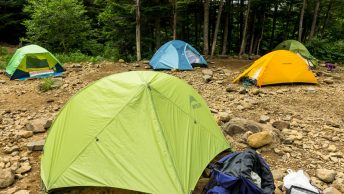
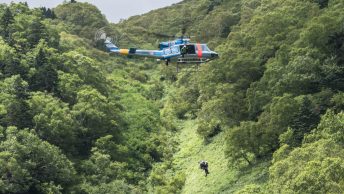
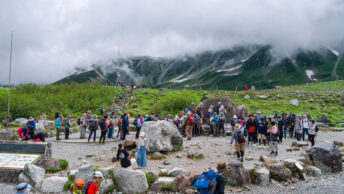
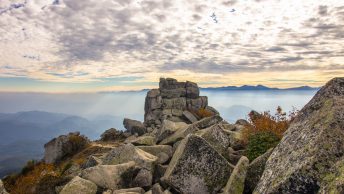
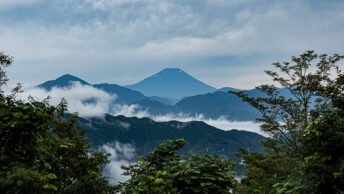

I like being early, too. I like to catch sunrises from peaks…
One thing to consider, though, is that bears get up early, too!
Many municipal web sites show records of bear sightings. Those are a good resource to look at when planning.
Good point, Pat and great suggestion about checking local government websites. That’s especially useful for anyone who’s a bit anxious about running into these furry creatures.
I started going out on the first train in order to maximize the probability of getting home from trailruns in time for dinner with the family. Now that I am out hiking and running longer and longer, I have come to appreciate all the points you make above.
To add to the ‘Building a Buffer’ section -another benefit of starting early is that you give yourself a better chance of catching the last trailhead bus back to the station.
Many times the last bus of the day is scheduled to leave based on expected traveler volumes, which coincides with ‘normal’ hiker schedules. If the norm is to get up early and finish early, then the last bus will probably leave early as well. The worst thing would be to get stranded on a Sunday evening and have to figure out how to be back.
Thanks for reading, Andrew. You’re totally right, and making sure you know when the last bus departs is essential. In some places, those final buses might leave earlier than expected or even vary from year to year. Missing one on a Sunday evening can easily mean getting stranded, and in some places, even hitching a ride may not be possible.
I try to get out as early as possible, but being just outside of the Ward area, and on the wrong side for the mountains, I find I am starting well into the morning. I guess I need to start biting a bullet and tacking on a hotel/hostel stay the night before to my hikes.
Depending on where you’re headed, you could also grab an overnight bus from Shinjuku Expressway Bus Terminal (Busta Shinjuku), which often works out cheaper than taking trains.
Hitting the trail by 4:30am sounds like summer? For other seasons, how long before sunrise do you plan to be moving on the trail? I’m hiking around Tokyo and the Northern Alps in Autumn. Last year, as another Australian, I congratulated myself if I was walking at 7, and it did seem a bit late
Yep, you’re spot on, Garth – that early start is for summer. The longest days here are in mid-June, while it gets dark fastest in early December. The latest I usually camp is November, and even then I still try to be moving by about 5:30. I’m certain you’ll beat your 7 am start this year!
Hi David, I’d like to add an 11th reason: because Japan doesn’t have daylight saving time in summer means that the sun is up very early: around 4am in Tohoku and Hokkaido. I remember once starting a hike in Hokkaido at 3:30am thinking it was going to be dark and was surprised when I didn’t need my torch!
Good point, Phil. The earliest official sunrise is around 4:24 am in (Tokyo) and 3:46 am in (Hokkaido) and as you said, the first light shows well before that.
Yep, in fact in Wakkanai the sun rises at 3:45 on the summer solstice. They could seriously do with some daylight saving!